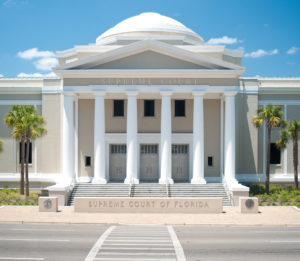The Florida Supreme Court has underscored the right for plaintiffs to win legal fees in some cases, even if they don’t prevail in court. The decision suggests that insurance companies’ efforts to reduce attorney fees in claims litigation may be far from over.
The June 15 opinion in Coates vs. R.J. Reynolds Tobacco Co. “definitely seems to be out of step with (Senate Bill) 2A and the Legislature’s concern about insurers having to pay the plaintiff’s attorneys’ fees,” said Robert Jarvis, a law professor at Nova Southeastern University. “I assume that the industry will ask the Legislature to overturn Coates by amending § 768.79 and, if so, I have no doubt the Legislature would do so.”

The decision is a follow-up to a major ruling in January that upheld the slashing of $16 million in punitive damages in a smoking case. Even though Brinda Coates, who sued on behalf of a sister who died of cancer, did not ultimately prevail in her monetary award, or did not win as much as she proposed, RJR must nonetheless pay her attorney fees for part of the litigation, the court found.
The plaintiff’s attorney had offered proposals for settlement of $75,000 and $749,000, which RJR had rejected. The jury later awarded Coates $300,000 in compensatory damages and $16 million in punitive damages. Florida’s 5th District Court of Appeal in 2020 said that award far exceeded the 3:1 ratio allowed by state law on punitive amounts, and remanded the matter to the trial judge.
In the end, Coates was allowed $450,000, considerably less than her last settlement offer.
After considering an appeal on who should pay the legal fees, the state Supreme Court said that the issue was a recurring one before the courts, and sought to clear the air. Florida’s offer-of-judgment statute, Section 768.79, is not a “prevailing party” law, but is designed to penalize those who do not accept a reasonable settlement offer, Justice Jamie Grosshans wrote in the opinion.
The tobacco company had argued against that interpretation, contending that it will result in a flood of frivolous appeals from non-prevailing parties seeking attorney fees. The court disagreed.
“Had the Legislature intended for section 768.79 to be a prevailing-party statute, it could have adopted similar language to the prevailing-party statutes mentioned above; but it did not,” Grosshans wrote.
Coates’ attorneys included John Mills, Courtney Brewer, Jonathan Martin, and Bailey Howard of the Bishop & Mills law firm.
Senate Bill 2A, approved at the Legislature’s special session on insurance in December 2022, has been described as a “once-in-a-generation” reform that may already be having an impact on the number of insurance lawsuits. Until the bill became law late last year, plaintiffs’ attorneys were able to win large fees – paid by defendant insurance companies – even if they prevailed by only a small amount in a court judgment.
SB 2A modified Florida statute 627.428. But it did not address fees for non-prevailing parties or the offer-of-judgment law, attorneys said.
The Coates’ decision “does not have anything to do with SB 2A, in my opinion,” and is not a major shift from previous court rulings, said Elaine Walter, secretary-treasurer of the Florida Defense Lawyers Association.
The ruling shows that legal fees can still be costly for defendants, and underlines the relevance of SB 2A in limiting at least some of those costs, said Kenneth Hall, litigation director with Universal North America Insurance Co.
In a separate appeals court ruling last week, Florida’s 1st District Court of Appeals held that an insurer cannot try to invoke the appraisal process after it has engaged in litigation. In Silvia vs. Castle Key Insurance Co., the Allstate subsidiary had argued that it wasn’t crystal clear that the insured homeowner had disputed the amount paid on a claim.
In two previous decisions, including a 2009 case involving Castle Key, the appellate court had decided that the insurer had not preempted its right to an appraisal panel by filing a motion for more information on the loss amount. But unlike those cases, Castle Key in Silvia filed an answer to the lawsuit complaint and requested a jury trial, actions that are inconsistent with the right to appraisal or arbitration, the 5th DCA noted.
“The record does not show that Castle Key deliberately evaluated the nature of the claims and then invoked appraisal at the first reasonable opportunity,” appeals court Judge Stephanie Ray wrote for the panel. “Instead, Castle Key actively participated in litigation, which conflicted with and thus waived its right to appraisal.”
The court dismissed Castle Key’s motion to invoke appraisal, and remanded the case to Washington County Circuit Court for consideration of the underlying claim dispute.
Topics Florida
Was this article valuable?
Here are more articles you may enjoy.



 What Analysts Are Saying About the 2026 P/C Insurance Market
What Analysts Are Saying About the 2026 P/C Insurance Market  Allstate CEO Wilson Takes on Affordability Issue During Earnings Call
Allstate CEO Wilson Takes on Affordability Issue During Earnings Call  Portugal Deadly Floods Force Evacuations, Collapse Main Highway
Portugal Deadly Floods Force Evacuations, Collapse Main Highway  Nine-Month 2025 Results Show P/C Underwriting Gain Skyrocketed
Nine-Month 2025 Results Show P/C Underwriting Gain Skyrocketed 


